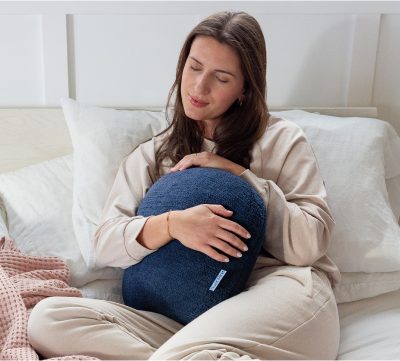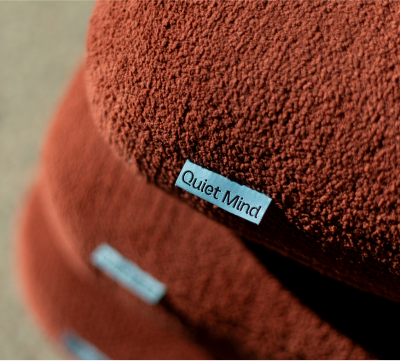You’re tired. Your body feels heavy, your mind worn thin. And yet—sleep doesn’t come.
This quiet contradiction is more common than it seems. For many, the harder they try to rest, the more elusive it becomes.
Understanding the reason behind this disconnect is the first step toward restoring a more peaceful rhythm.
Why You May Feel Tired at Bedtime But Still Can't Sleep
It’s a confusing cycle: you feel tired during the day — your body aching, your mind dragging—and yet when night falls, you lie awake, unable to sleep.
This paradox leaves you physically and emotionally drained, disrupting your productivity, mood, and relationships. Many people assume tiredness equals sleep readiness, but that’s not always the case.
When you’re running on low energy yet can’t fall asleep, it’s not just frustrating—it’s a sign of deeper imbalance. Chronic exhaustion without rest can leave you feeling tired even after a full night in bed.
Over time, the quality of your sleep erodes, affecting memory, immune function, and emotional resilience. Understanding why this happens is the first step toward healing your relationship with rest.
Understanding Stress and Anxiety That Disrupt Sleep at Night
You might wonder, “Why can’t I get a proper night's sleep even though I’m tired?” This isn’t just a rhetorical question—it’s one millions of people silently ask themselves while staring at the ceiling at 2 a.m.
Sleep is a biologically complex process easily thrown off by mental, emotional, and environmental triggers. You may feel physically depleted but still be mentally active. Thoughts loop endlessly, worries spiral, and even minor stressors can keep you awake. These internal alert signals override the exhaustion, creating a feeling of being tired but wired.
This disconnect can be even more pronounced if you’re navigating high-functioning anxiety, ADHD, or chronic stress. You may feel exhausted from managing emotional intensity all day, only to be kept awake by the lingering effects of cortisol or adrenaline. Even though you’re tired, your nervous system might still be stuck in “on” mode, leaving your body unable to sleep—even if you feel sleepy.
A Mind That Won’t Power Down
Mental fatigue doesn’t always translate to sleep readiness. You might feel emotionally spent yet find your brain wide awake. Racing thoughts, replaying conversations, or worrying about tomorrow’s to-do list can prevent the shift into sleep. This kind of overthinking activates your sympathetic nervous system—your fight-or-flight response.
Even subtle stressors, like unanswered emails or relationship tension, can raise cortisol levels and make it harder to fall asleep. You may feel tired but can’t sleep because your body interprets the environment as unsafe or unfinished.
Stress, Anxiety, and Emotional Overload
Stress and anxiety are among the most common reasons for sleep deprivation. When the brain perceives danger—real or imagined—it keeps the body in a state of hypervigilance. You may lie in bed with your heart racing, your breathing shallow, and your thoughts spiraling.
Even more quietly, emotional overload can show up in physical ways: muscle tension, elevated cortisol, night sweats, or restlessness. If you're experiencing sensory overload, it can significantly delay your ability to wind down at night.
If you’ve ever been tired at bedtime but unable to switch off, you’re not alone. Emotional strain can keep your nervous system on high alert long past the moment you want to sleep.
Irregular Routines and Sleep Hygiene
Many sleep disturbances stem from inconsistent routines and poor sleep hygiene and habits that quietly sabotage rest.
Sleep hygiene refers to the behaviors and environmental factors that influence the ease and quality of sleep. Unfortunately, modern lifestyles often disrupt sleep more than they support it.
Late-night scrolling, caffeine after 3pm, and skipping wind-down rituals all contribute to an irregular sleep schedule.
These habits confuse your internal clock, or circadian rhythm, making it harder to fall and stay asleep. Even if you maintain a consistent bedtime on weekdays, shifting drastically on weekends can mimic the effects of jet lag.
Practicing good sleep hygiene means being intentional: dimming lights in the evening, turning off devices at least 30 minutes before bed, and keeping a regular sleep schedule.
A consistent sleep schedule strengthens your brain’s ability to anticipate rest, helping you fall asleep at night faster and experience more restful sleep.
Hidden Sleep Disorders
If you’re doing everything “right” and still waking up exhausted, an underlying sleep disorder could be the reason. Conditions like sleep apnea or restless legs syndrome often go undiagnosed, silently disrupting your rest night after night.
Persistent fatigue, physical restlessness, or trouble staying asleep may be signs that something deeper is interfering with your sleep cycles.
In some cases, insomnia or sleep-related issues can even mimic symptoms of anxiety or depression — making it harder to identify the root cause. If you regularly spend 7–9 hours in bed but still feel unrefreshed, it may not be a matter of how long you’re sleeping, but how well.
In these cases, it’s worth speaking to a sleep specialist who can help uncover what’s really going on beneath the surface.
Lifestyle Habits That Quietly Disrupt Your Sleep at Night
You might be following a sleep schedule and still struggling to sleep—and lifestyle choices could be the reason. Even healthy-seeming routines may disrupt your sleep cycle if not timed thoughtfully.
- Afternoon caffeine can linger in your system for several hours, making it harder to fall asleep at night.
- Alcohol may make you drowsy at first, but it disrupts REM sleep and can lead to early awakenings or restlessness.
- Heavy meals late at night trigger digestion when your body should be winding down, making it hard to sleep despite feeling tired.
- Eating or drinking alcohol too close to bedtime can raise your body temperature, interfering with the natural drop needed for restful sleep.
- Lack of sunlight exposure during the day can confuse your internal clock, delaying the release of melatonin.
- Skipping physical activity can leave you mentally exhausted but physically under-stimulated—making it harder for your body to prepare for rest.
-
Eating late at night can leave you feeling uncomfortable in bed. Adjusting your sleep position may ease that pressure and help you rest more easily.
Blue Light and Screen Time
Exposure to screens late at night doesn’t just make it hard to sleep—it actively blocks melatonin, a hormone critical for rest. Even 30 minutes of screen exposure can suppress melatonin and shift your circadian rhythm.
Reducing screen time before bed is one of the most underrated healthy habits and can significantly improve your sleep quality. If you find that you can’t sleep, even when you’ve limited caffeine and stress, consider how much blue light you’re exposed to after dark.
Understanding the Disconnect: When You’re Tired, But Still Awake
Being tired but unable to sleep is not a failure of willpower—it’s a biological mismatch. You may be mentally or emotionally exhausted but still alert on a physiological level.
Cortisol, the body’s stress hormone, plays a major role here. When cortisol remains high in the evening, it signals the body to stay alert. This can happen from unresolved stress, irregular routines, or even excessive screen time. For some people, it becomes a pattern—like delayed sleep phase syndrome—where the body naturally shifts toward a later sleep and wake cycle.
You may also experience this disconnect if you’re mentally stimulated but physically inactive. A sedentary day can leave you understimulated physically while mentally exhausted, making it hard to wind down at night.
Even when you’re tired, your body might not recognize the need for rest unless it’s been given enough movement and exposure to natural cues like daylight.
What to Do When You're Tired but Wired
The solution isn’t to force sleep—it’s to gently guide your body into a state where sleep can emerge naturally.
- Start with a calming evening ritual—dim the lights, sip a warm herbal tea, listen to soft music, or take a relaxing shower. These gentle cues help shift your nervous system from “doing” to “being,” setting the stage for a more restful sleep environment.
- Keep a consistent sleep schedule, even on weekends. Going to bed and waking at the same time daily trains your internal clock to expect rest.
- Using a weighted pillow can enhance your relaxing sleep environment by providing grounding sensory input. The evenly distributed weight creates a calming pressure that may help soothe the nervous system and ease restlessness. It also promotes a greater sense of security, making it easier to relax both physically and mentally before sleep.
- Avoid stimulating activities (like screens or intense conversations) within an hour of bedtime. Prioritize slow, grounding rituals instead.
- Support your wind-down with natural supplements. Some research suggests that magnesium and L-Theanine capsules help ease muscle tension and calm the mind—making it easier to fall asleep without drowsiness.
- If you can’t fall asleep within 20–30 minutes, get out of bed and do something calming—like reading under soft light or deep breathing—rather than lying in bed feeling frustrated.
Natural Ways to Reset Your Rhythm and Support Better Sleep
If you lie in bed with a racing mind, gentle breathwork like box breathing can help you get back to sleep. Try breathing in for 4 counts, holding for 4, exhaling for 4, and holding again for 4.
Body scanning is another useful practice. Bring your awareness to different areas of the body and consciously relax each one. Mindfulness techniques like this help shift your body into a parasympathetic (rest-and-digest) state—perfect for easing into sleep.
Creating a bedtime routine can be simple—this guide offers easy ideas that combine calming habits and gentle sensory cues to help you unwind.
Natural Remedies to Support Rest
Nature offers gentle, time-tested support for those struggling to sleep. While no remedy can replace consistent sleep habits, the right ingredients can help nudge your body toward rest.
- Herbal allies like chamomile, valerian root, and lavender have been used for centuries to promote sleep.
- Chamomile’s mild sedative properties help soothe the nervous system, while valerian root may improve the amount of sleep and depth.
- Lavender, when used as an essential oil or herbal infusion, supports a relaxing sleep atmosphere and may reduce nighttime anxiety.
- Magnesium is often used to support relaxation and may play a role in melatonin production.
- L-Theanine is known for its calming properties and is often used to support relaxation before bed. Together, these ingredients help you feel able to sleep by reducing stress rather than forcing sleep chemically.
Some of these natural sleep aids are also safe and effective for children, especially when used as part of a bedtime routine.
When to Visit a Center for Sleep or Seek Professional Support
If you’ve tried multiple strategies and still can’t sleep, it may be time to explore clinical support. Conditions like sleep apnea and insomnia aren’t always obvious—but they can severely impact rest.
You may experience symptoms like frequent waking, gasping for air, restless legs, or persistent anxiety. These could indicate a common sleep disorder that requires treatment. Sleep medicine clinics or a sleep specialist can evaluate your sleep patterns, often through overnight studies.
Therapeutic options like CBT-I (Cognitive Behavioral Therapy for Insomnia) can help retrain your brain’s relationship to rest, especially if you’ve dealt with long-term sleep issues.
Final Thoughts: Rest Is Within Reach
Even when sleep feels out of reach, your body isn’t broken—it’s simply responding to what it perceives as a threat or misalignment.
Instead of blaming yourself or trying to “fix” your sleep forcefully, shift toward curiosity. What signals is your body receiving? What subtle stressors might be disrupting your rhythm? Sleep is not a task to be achieved—it’s a state to be allowed.
Begin with softness. Acknowledge your exhaustion and your efforts. Prioritize sleep hygiene, gentle rituals, and supportive tools. Over time, you’ll find that rest comes—not as a struggle—but as a homecoming to your own calm.
About QuietMind
At Quiet Mind, we believe in the power of simple, natural solutions to ease the mind and body. Our signature weighted pillows are designed to provide comforting pressure, helping to alleviate stress, anxiety, and restlessness.
Whether you're seeking a moment of calm during a hectic day or a more restful night's sleep, Quiet Mind offers tools to support your journey toward tranquility. Discover the soothing embrace of our weighted pillows and find your path to a quieter mind.
FAQ: Why Can’t I Sleep Even Though I’m Tired?
Why do I feel exhausted but can’t fall asleep?
Mental overstimulation, high cortisol levels, anxiety, or inconsistent sleep habits can make it difficult to fall asleep even when you're tired.
What can I do when I feel ‘tired but wired’?
Start with quiet rituals—dim lighting, screen-free time, and calming breathwork. Consider natural supports like magnesium, L-theanine, or herbal teas.
Can stress prevent sleep?
Yes. Stress elevates cortisol and activates your sympathetic nervous system, which keeps your body in an alert state that prevents rest.
How do I reset my circadian rhythm?
Wake at the same time daily, seek morning light, limit evening screen exposure, and keep a consistent bedtime—even on weekends.
When should I see a doctor for sleep problems?
If you experience persistent sleep difficulties for more than a few weeks, or if it affects your health or quality of life, professional insight can help.

















